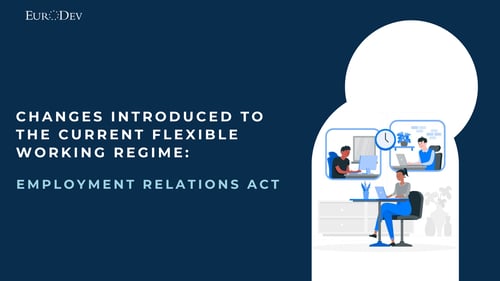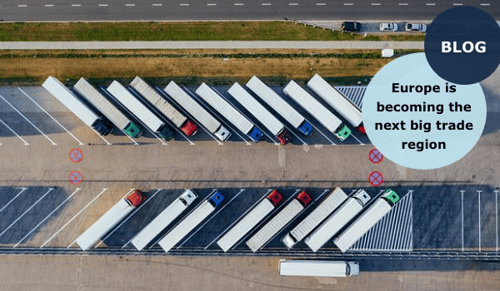New EU Regulations: The EU’s Platform Economy Regulations
In the rapidly evolving economic landscape, most developed countries are closely monitoring the developments and regulatory changes in the European Union regarding flexible working, specifically with platform workers. In the past couple of months, the European Union has had growing concerns with the previously unregulated market that provided work on a basis of direct supply and demand. Henceforth, to protect the workers, the EU is currently enforcing a law that will improve the working conditions and social rights of people who are working in this economy.
The digital platform economy has experienced significant growth over the past couple of years, currently engaging 28 million individuals in various forms of platform work. With the growing trends in remote and flexible working in the European market, the number of platform workers is expected to rise to 43 million by 2025. Financially, the sector has seen a 366% growth, jumping from 3 billion euros in 2016 to 14 billion euros in 2020.
This report provides insights and strategies for businesses looking to understand and adapt to these regulatory changes.
EU’s Regulatory Framework
The European Union is leading the way in establishing regulations for platform work, aiming to balance rapid innovation with the protection of workers' rights. These regulatory shifts are crucial for businesses, especially those operating in international markets or considering expansion into Europe.
-
Social security: The European Union has introduced innovations to extend social security to platform workers. In France for instance, platforms are required to cover the accident insurance costs of self-employed workers. In countries like Finland, platforms are required to extend unemployment benefits to these workers.
-
Access to data and privacy: The EU is adopting measures regarding data protection and privacy. Recently the French court amended the labor Code to give self-employed workers in the transportation industry the right to access data related to their platform activity. In the Netherlands, the court also ruled in favor of data transparency for drivers on a taxi platform including with regard to automated decision-making processes for penalties. In Spain, delivery workers on platforms were offered the right of information for the representatives of workers in the digitized work environment.

Decoding Employment Status
The ambiguous employment status of platform workers is a central issue addressed by the EU’s new regulations. The EU has established criteria to assist with the classification of workers. If workers meet at least three of the seven criteria, they are classified as employees, not self-employed.
The criteria in the new directive are the following:
- Determines upper limits for the level of remuneration
- Requires the person to respect certain rules with regard to appearance, conduct towards the recipient of the service or performance of work
- Supervises the performance of work, including by electronic means
- Restricts the freedom to choose one's working hours or periods of absence
- Restricts the freedom to accept or to refuse tasks
- Restricts the freedom to use subcontractors or substitutes
- Restricts the possibility of building a client base or performing work for any third-party
This shift is significant, given that an estimated 5.5 million workers are currently in de facto employment relationships with digital platforms.

Algorithmic Management Transparency
The EU is focusing on improving transparency in AI-powered management tools to align with the broader global conversation on data privacy and ethical AI practices. Companies need to understand these developments to leverage emerging opportunities associated with increased transparency and ethical data usage.
The new EU Regulation for platform workers is focused on
- Increasing transparency with regard to how algorithms are being used
- Ensure human monitoring of working conditions
- Give the right to consent to automated decisions for both parties
Implications for Non-EU Companies
The nature of the digital economy means that the impact of the EU regulations will be felt worldwide. Companies that operate or have ties with Europe will need to realign their operational and HR strategies with these regulations to ensure compliance and mitigate risks.
The legislative development is a sign of what could unfold in countries like the US, Canada, and the UK. In the US, the digital economy is expected to comprise 43% of the workforce by 2025. This advancement is a wake-up call for governments and nearby economies to implement laws similar to the EU. As the gig economy continues to flourish, discussions around workers’ rights, employment classifications, and algorithmic transparency are bound to intensify.
More information
As an expert EOR provider in Europe, we understand the complexities of the European regulatory landscape. To stay informed and compliant with these regulations, you can consider partnering with EOR providers that can support you in navigating the complex legal landscape
Explore our Sales Outsourcing and HR Outsourcing services.
Category
Related articles
-

The Employment Relations Act: Changes to the flexible working regime
Last updated: 19 December 2023Explore changes in flexible working regulations with the Employment Relations Act. EuroDev guides...
Read more -

Policy Updates: Adapting HR Practices to New Parental Protection Laws
Last updated: 19 December 2023Explore the latest insights on parental protection laws, ensuring compliance and fostering a...
Read more -

Europe Is Becoming the Next Big Trade Region
Last updated: 1 June 2023Europe has started to become the new export region for many companies, especially North American...
Read more

